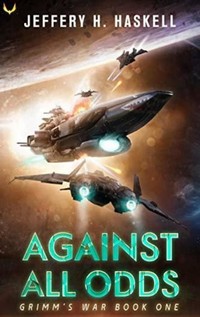 Against All Odds
Against All Odds
DETAILS: Series: Grimm's War, #1 Publisher: Aethon Books Publication Date: April 19, 2022 Format: Kindle Edition Length: 448 pgs. Read Date: June 13-16, 2022

Chief Boudreqx rolled the ship until the belly faced Kremlin and the cockpit looed out into open space…open except for her.
The Interceptor. The front of her hull was painted like a shark’s head, but it was old and faded, scratched and worn.
Jacob had spent most of his life waiting for this moment, and in it, all his concerns about his past, his present, and his future faded away.
He didn’t care if she looked like a beaten prizefighter with her armored hull dented and streaked from action. Or if the turrets were scratched, streaked, and patched.
Only that she was his.
What’s Against All Odds About?
Two years ago, Lt. Jacob Grimm, did the right thing in a crisis situation. Sadly, the optics of his action were horrible and the political fallout from it turned a promising Naval career into a dead-end endeavor. He’s assigned to an obscure post—where he does well but is destined to fall into obscurity and having to leave the navy.
Then politics intervenes again—and he’s assigned a ship to command. The commander unexpectedly died of natural causes a couple of months ago, and Interceptor needs someone to get it back into shape. Grimm doesn’t know the politics behind this assignment—and doesn’t care. This is his last hope of doing anything with his time in the Navy that won’t be covered in scandal.
In the intervening months, the ship has fallen into disrepair (its major drive component is missing!), and there’s little-to-no discipline among the crew. Grimm has his work cut out for him.
Meanwhile, a hostile (foreign) government, pirates, other criminals, and an obsessed scientist are at work in this sector—naval high command is up to something, too. Grimm and his crew only know about the pirates, so they don’t realize just how interesting/dangerous life is going to get.
The Technology of this Universe
He wasn’t in uniform, but the cap was a universal spacer adornment. Ships were almost always on the cold side, enough to be uncomfortable without warm clothes and a watch cap. If a ship was warm, something was terribly wrong.
One thing every book about interstellar travel has to deal with is how both travel and communication are handled. I appreciated Haskell’s approach, it feels as grounded as any series that’s not going to force generation ships on everything can be.
The way he designed the technology/construction/etc. of the ships really appealed to me. There’s a very Star Trek-feel to the whole thing, but without the shiny panels and great lighting, the physical aspects of the ships are more Firefly-like. Think Moore’s Battlestar Galactica, just slightly less advanced.* There’s also a feel of 20th Century Navy ships and submarines—unforgiving metal everywhere, a focus on function over comfort/aesthetics; cold temperatures everywhere; worrying about what could happen to things that aren’t bolted down while the ship moves; food that’s nutritious, but not necessarily appealing.
* I’m a little annoyed with myself here. I spent the entire novel thinking about the Star Trek/Firefly comparison and only got around to BSG because I wanted to throw on some Bear McCreary as I wrote this. BSG is a better way to envision the tech/atmosphere. There’s a very non-subtle Star Trek homage in the novel, so I feel okay getting it stuck in my mind.
So, what did I think about Against All Odds?
I’ve enjoyed the first two novels in Haskell’s Full Metal Superhero series (and have been kicking myself for years for not reading more of them), but this? He’s clearly been working his craft since 2017, and it has paid off here.
I spent a good portion of the novel wishing he’d spend less time on the subplots—assuming they’d end up being important, but all I wanted to do was get back to the Interceptor. It made me question several of my reading choices over the last couple of years—why didn’t I read more things like this? There was a brief spy vs. spy thing, too, as part of a subplot—I could’ve used more of that. But once the subplots started converging on the Grimm/Interceptor story? It was like having my cake, eating it, too—and not caring about my A1C levels.
My impatience aside, this was skillfully paced—he kept the tension mounting as you become more invested in the various crews and characters, and as the layers of the plot get pulled back to reveal Haskell’s game plan. The combat scenes—the ship vs. ship scenes in particular—were great. There are times I feel shallow and adolescent for enjoying that kind of thing the way I do, but I get over that pretty quickly.
I would say the Epilogue felt unnecessary—if the reader didn’t assume most of what we got there already, I’m not sure they were paying attention. I think it’d have been better for Haskell to trust the reader to assume the Epilogue and/or to see the effects of it play out over the next book or two without spelling it out quite the way he did. That’s my major beef with the book, and if it takes until the Epilogue to get something like that? That’s a pretty good sign. There were a couple of other choices I questioned, but I want to see what Haskell does with them before I spend too much ink on them.
I’ve got Book 2, With Grimm Resolve, scheduled for mid-July—and at least one too many books on my June schedule—but it took all my discipline not to dive into it after finishing this. Do yourself a favor, grab some popcorn and settle down with this for a couple of hours—you’ll have a whale of a time.

![]()



Read Irresponsibly, but please Comment Responsibly